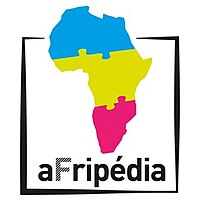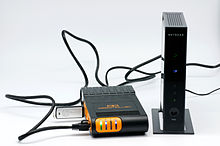 Afripedia Logo Afripedia Logo |



The Afripedia Project is a project to expand offline Misplaced Pages access in French-speaking Africa, and encourage Africans to contribute to Misplaced Pages. The project installs local Kiwix-serve wireless and intranet servers and provides training and maintenance.
The project offers content besides Misplaced Pages, such as Wiktionary. Any content that is first packaged in a ZIM file can be relayed over the Afripedia network; Project Gutenberg and Wikisource, for instance, are available in that format.
History
| This section needs to be updated. Please help update this article to reflect recent events or newly available information. (February 2016) |
The Afripedia Project launched in 2012. The founding partners were Wikimédia France, the Institut Français, and the Agence universitaire de la Francophonie. French is spoken by an estimated 120 million (2010) people in Africa, spread across 24 francophone countries.
Project preparation, partnership formation, Kiwix algorithm development took place in 2011.
In July 2012 the project and prototype was presented at the Forum mondial de la langue française in Québec. In November 15 leaders from 12 East and Central African countries were trained and 15 offline access points were deployed.
Additional training session were held in 2013 and 2014.
Access to Misplaced Pages from USB flash drives was not new at the time, but the data they care quickly befome outdated. Afripedia by contrast is regularly updated. Many of the partnering universities have low-bandwidth internet and a few lack any internet access.
The project encourages the formation of Afripedia clubs for local users.
The project was described as a worthy stopgap measure, until such time as internet access can be developed throughout Africa.
See also
References
- ^ Duchemin, Dorothée (2012-06-22). "Afripedia, Wikipédia pour l'Afrique". Citazine (in French). Retrieved 2023-11-28.
- ^ Afripedia project increasing off-line access to Misplaced Pages in Africa, Wikimedia article
- ^ "Afripédia : un projet de promotion de Wikipédia en Afrique, news article in Afrik". Archived from the original on 2017-09-05. Retrieved 2016-02-10.
- Kiwix list of available content
- Emmanuel Engelhart: 50.000 public domain books available to everybody, everywhere, offline. In: Wikisource-l-Mailinglist. 19. November 2014. Accessed on 26 November 2014.
- ^ "Afripedia ou comment consulter Misplaced Pages sans Internet". Slate Afrique (in French). 2012-06-22. Retrieved 2023-11-28.
- (in French) La Francophonie dans le monde 2006–2007 published by the Organisation internationale de la Francophonie. Nathan, Paris, 2007
- #Wikimedia & Project #Gutenberg – the sum of all knowledge on Words and what not blog
- Afripedia project website